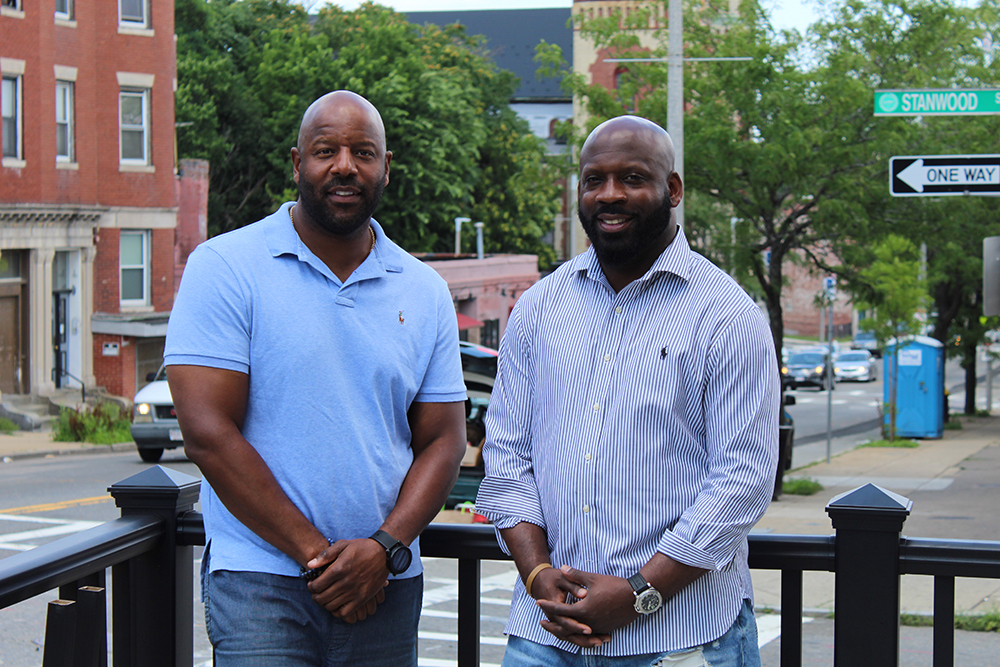In a symbol of efforts to make the cannabis industry more inclusive, Boston’s first recreational dispensary will be owned and operated by two black men who have been assisted by Massachusetts’ cannabis social equity program. Kobie Evans, who grew up in the Dorchester neighborhood of Boston, co-founded Pure Oasis LLC with his business partner Kevin Hart, from Baltimore, Maryland. Both are new to the industry.
On July 17, the state’s Cannabis Control Commission (CCC) granted Pure Oasis a provisional license for a cannabis retail business in Dorchester. The store will need to be inspected by state regulators before being granted a final license to open for business. This could happen within the next 90 days.
Evans and Hart qualified for the CCC’s economic empowerment program, which is a component of the state social equity program—designed to reduce barriers to entry into the legal cannabis industry for disadvantaged entrepreneurs. Criteria to qualify include living in neighborhoods with high marijuana arrest rates and business ownership by people of color, among several others.
The CCC allowed eligible applicants to receive priority in having their completed license applications reviewed. This review period is currently closed. WBUR reported that the CCC received only 10 economic empowerment applications in its initial period—a low number caused by the difficulties and expenses of the licensing process.
“We both grew up in the inner city, with the first-hand experiences of over-policing and the damage of the War on Drugs in our communities,” Kobie Evans told Filter. “But then we saw legalization of cannabis and how people started making billions of dollars. And of course we had the ballot measure here in Massachusetts that set out to provide the opportunity for people like us to get involved in this business.”
When Massachusetts legalized recreational cannabis in 2016, the language of the new law demanded that the state work to create opportunities for and repair the communities most harmed by the War on Drugs. Evans and Hart had no prior experience in cannabis, having worked for years in real estate and healthcare, respectively. But the new law inspired them.
“We had to learn all about the industry, the regulations and everything involved in two and a half years,” Evans said. “At a certain point you have to rent, buy or lease expertise. But once you’re in this industry, people are more than willing to help and bridge those gaps for you.”
Evans and his co-founder had to finance the business with their own money, plus whatever help they could get from friends and family. They didn’t partner with any larger business or investors.
“This is an industry where no one gets loans from banks,” Evans said. “All of the funding comes from investors. But most investors shy away from economic empowerment applicants because so few of us get approved, and the law doesn’t create an easy exit strategy for us.”
He also explained that if he wanted to sell his business, he could only sell it to another economic empowerment applicant.
Though Evans praised the state’s economic empowerment program as “the most progressive in the country”, he said the greatest barrier facing entrepreneurs in Massachusetts is the local approval process. Cannabis businesses have to be approved by their cities or towns through a host community agreement (HCA). These agreements may require that businesses give up to 3 percent of their revenues to the host city for a period of several years.
“In Massachusetts, your success is dependent on getting local approval, and that process has been marred by the lack of interest among cities and towns to address equity,” Evans said. “Most cities and towns don’t recognize equity as a factor in determining who gets a license. You’re seeing a lot of politically connected businesses get HCAs, while people like myself are side-stepped.”
As examples, Evans cited towns like Brockton, Fall River and Amesbury, where governments have been accused of undermining the goals of equity or abusing the HCA process. In contrast, he praised the city of Boston for supporting equity in cannabis licensing, which Mayor Martin Walsh says he is prioritizing.
The state requires that Pure Oasis must also implement a Positive Impact Plan that will benefit its community. A portion of the store’s revenue will be earmarked for different projects that the company is developing with local nonprofits. Evans hopes his store will leave a lasting imprint on his city.
“We want to inspire others by demonstrating that we are from this community and can be successful businesspeople,” he said. “We want to open an incubator to work one-on-one with people from disadvantaged communities in Massachusetts, and help them realize their goal of owning a business and building generational wealth.”
When it opens, Pure Oasis will be the first cannabis dispensary in Boston—and the first in the state to serve a predominantly African American and Caribbean American neighborhood. “This is an industry that was born out of trauma from the War on Drugs,” Evans said. “But it’s critical that people of color and people from the inner city communities see that now is the time to get involved. Waiting around isn’t going to help us.”
Photo of Kobie Evans and Kevin Hart, courtesy of Kobie Evans.




